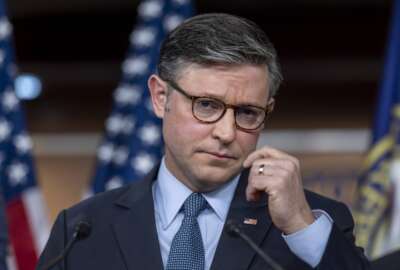Postal Service warns Senate of dire finances
Postmaster General Patrick Donahoe warned senators that the Postal Service would stop delivering mail by next August unless Congress authorizes sweeping changes.
wfedstaff | June 4, 2015 10:49 am
By Emily Kopp
Reporter
Federal News Radio
Postmaster General Patrick Donahoe warned that the Postal Service is on “the brink of default,” as he battles to keep his agency solvent.
Without legislation by Sept. 30, the agency “will default on a mandated $5.5 billion payment to the Treasury,” Donahoe told the Senate Homeland Security and Governmental Affairs Committee on Tuesday.
He painted a dire picture. After meeting payroll and paying a $1.3 billion workers’ compensation debt to the Labor Department in October, Donahoe said the agency would have just one week’s worth of cash left.
And with no congressional action, the post office could run out of money to pay salaries and contractors at about this time next year, he said, hampering its ability to operate.
“We do not want taxpayer money,” Donahoe said, “We have got to get our finances in order.” The Postal Service is asking Congress to enact legislation that would allow it to regain some of the estimated $50-70 billion that it has prepaid to federal pension programs. In addition, it wants lawmakers to let it break union contracts so that it can lay off more than 100,000 workers by 2015, and to allow it to end Saturday delivery. At the same time, the Postal Service is considering shutting 3,700 small post offices nationwide.
Committee Chairman Sen. Joe Lieberman (I-Conn.) said: “We must act quickly. The U.S. Postal Service is not an 18th century relic, it is a 21st century national asset, but times are changing rapidly now and so, too, must the post office.”
Sen. Susan Collins (R-Maine) noted that the post office supports a $1.1 trillion mailing industry employing more than 8 million people in direct mail, periodicals, catalogs, financial services and other businesses and they would be hurt by ending Saturday deliveries. She said she’s worried rural communities would be left behind if their post offices closed. If the Cliff Island, Maine office shuttered, she said, islanders would have to travel more than an hour by ferry for all but the most basic postal transactions.
Sen. Tom Carper (D-Del.) noted several proposals have been put forward to improve postal operations and said that Congress needs to work on areas where agreement can be found. While the Postal Service needs to “right-size its workforce,” he said, it may be able to offer incentives rather than break union contracts to cut jobs. Both Carper and Collins have introduced bills to reform postal operations, and measures have also been introduced in the House.
Meanwhile, Office of Personnel Management Director John Berry testified on behalf of the Obama administration. He said the White House would propose its own reform plan as part of a $1.5 trillion proposal to lower the federal deficit. In addition, he said the administration would give the Postal Service 90 more days to pay the $5.5 billion it owes for federal benefits. While OPM supports returning some of the pension overpayment to the Postal Service, he told the Senate panel that Congress would have to mandate that because OPM does not have the authority to act on its own, he said.
Donahoe said the 90-day reprieve would make October a bit more bearable, but would not help in the long run.
Donahoe and his predecessor John Potter have warned for months that without changes in the law governing postal operations the Postal Service will be unable to make advance payments to cover future retiree medical benefits.
Squeezed by the economic downturn and the massive shift from first-class mail to email, the post office lost more than $8 billion last year and is facing losses at least that large this year, despite having cut 110,000 jobs over the last four years and making other changes, including closing smaller, local post offices.
The Postal Service, which does not receive tax money for its operations, is not seeking federal funds.
Instead, postal officials want more control over the way they operate, including relief from the requirement that it prefund medical costs. No other federal agency has to prefund retiree health benefits, but because of the way the federal budget is organized the money counts as income to the government, so eliminating it would make the federal deficit appear larger.
When Congress restructured postal operations in 2006 it ordered the agency to establish a separate fund to begin covering those benefits, instead of using money for the post office’s general fund, starting in 2017, and to make annual advance payments to that account. The payment due Sept. 30 would be $5.5 billion.
(The Associated Press contributed to this report)
RELATED STORIES:
Postal Service plans to cut 220,000 jobs
Postal Service: Out of cash next month
USPS identifies 3,700 post offices for possible closure
(Copyright 2011 by Federal News Radio. All Rights Reserved.)
Copyright © 2025 Federal News Network. All rights reserved. This website is not intended for users located within the European Economic Area.





